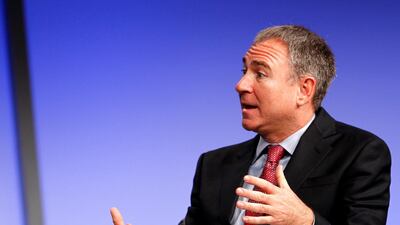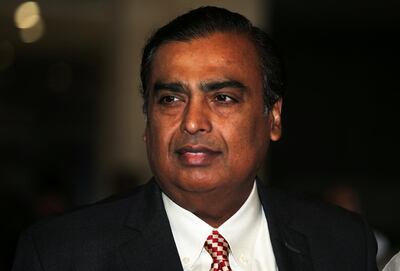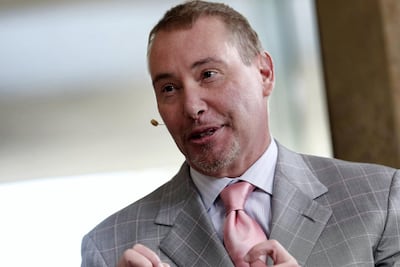Ken Griffin
American hedge fund billionaire Ken Griffin set a record for the most expensive home ever sold in the US with the purchase of a $238m (Dh874m) New York penthouse just days after he bought a £95m (Dh450m) home in London about one kilometre from Buckingham Palace.
The founder and chief executive of the global investment firm Citadel purchased the Manhattan penthouse at an under-construction high-rise, 220 Central Park South. The approximately 24,000 square feet (2,200 square metres) apartment will give him a place to stay when he’s working in New York, a Citadel spokeswoman said.
“He’s definitely a global trophy hunter and he bought what would arguably be now the number one building in New York,” said Donna Olshan, president of Olshan Realty.
Mr Griffin is no stranger to multimillion dollar homes. He bought several floors of a Chicago condominium this year for $58.75m (Dh216m), setting a record for the most expensive home ever bought in Chicago. In 2015, he bought a Miami penthouse for $60m (Dh220m), setting the record for a Miami condo.
The 200-year-old London house he acquired earlier this month overlooks St. James’s Park and housed the private office of Charles de Gaulle during World War II. He paid less than the original asking price of £145m and less than the £125m price tag offered in the past two years, according to the Financial Times.
“It’s an iconic property with great history,” said Charles McDowell, founder of Charles McDowell Properties. “He’s picked it up for a discount. For people who’ve got the money, there are real buying opportunities in London.”
The historic Georgian-era home was redeveloped by property developer Mike Spink in a venture with Evans Randall Investors. The 20,000 square-foot (roughly 1,900 square-metre) house includes a gym, pool and underground extension.
Mr Griffin has a $9.6 billion fortune, according to the Bloomberg Billionaires Index, a ranking of the world’s 500 wealthiest people.
Mukesh Ambani
Reliance Industries chairman Mukesh Ambani, India’s richest man, will take on the world’s largest retailers by rolling out an online shopping platform in the next 12 to 18 months across India, according to people familiar with the matter.
Mr Ambani will combine his Jio telecom service, mobile devices and a vast physical retail network to launch the new offline-to-online platform to 1.2 million retailers and store-owners in western India. The project is part of an ambitious plan to compete with Amazon and Walmart’s Flipkart in the world’s fastest-growing major e-commerce market.
Jio currently has 280 million telecom subscribers, while Mr Ambani’s retail arm operates nearly 10,000 outlets across more than 6,500 Indian cities and towns.
“Jio and Reliance Retail will launch a unique new commerce platform to empower and enrich our 12 lakh [1.2 million] small retailers and shopkeepers in Gujarat,” the Reliance chairman said.
Trials of the company’s new initiatives are ongoing in six cities including Mumbai, Kolkata, Chennai and Bengaluru.
As the initiative expands, Reliance Industries will look to enlist more neighbourhood mom-and-pop shops — which make up about 90 per cent of India’s retail landscape — as distribution and delivery centres for some products that will be available on its mobile platform, the people said.
Mike Ashley
Mike Ashley, the British billionaire owner of retailer Sports Direct International and Newcastle United football club, made a bid for embattled music retailer HMV Group, according to a person familiar with the situation.
HMV began insolvency procedures last month for the second time in six years as physical records have become outmoded in favour of online music streaming. If Mr Ashley’s bid is accepted, he will be expanding his grip on UK shopping even more, after rescuing department-store chain House of Fraser last year. He also owns significant stakes in Debenhams, Game Digital and French Connection Group.
The bid is one of a number of offers for the music and entertainment chain, which has 125 shops in the UK, employing 2,025 people. They are set to stay open while bids are examined, according to administrator KPMG.
Mr Ashley is examining offers for a number of troubled retailers, but is “serious” about buying HMV, according to Sky News.
Jeffrey Gundlach
DoubleLine Capital chief executive Jeffrey Gundlach said in a tweet that he will be deleting his Twitter account “due to suspicious activity.” It’s not clear what suspicious activity Mr Gundlach was referring to.
The billionaire bond-fund manager is known for his outspoken views, often using his Twitter account @TruthGundlach to express his opinions. In December, he described Deutsche Bank AG as a "sick puppy" and earlier this month he commented “Hmmm” after Netflix, and incidentally his local breakfast place, raised prices for the first time in years.
Mr Gundlach has had a stormy relationship with much of the media. He said in a tweet in December he would no longer appear on CNBC, blaming the decision on Jim Cramer, who hosts the network’s “Mad Money” programme and had said the investor should “stick to bonds” after he made comments on the stock market.
Mr Gundlach isn’t the only high-profile executive to swear off social media. Media baron Rupert Murdoch, who first joined Twitter in December 2011 and used to be reasonably prolific, hasn’t been active since February 2017. Elon Musk also said he would stay off Twitter for a few days after his Tesla privatisation comments, but has since returned.
Jose Isaac Peres
Brazilian developer Jose Isaac Peres is investing millions to build residential projects in Miami Beach, Florida, while dismissing rising sea levels due to climate change as “paranoia.”
The real estate magnate and chief executive of Multiplan, one of Brazil’s largest shopping mall operators, is planning 81 units at 57 Ocean, where the penthouse will cost $31m (Dh114m). He is also seeking permission to build another condo project, a four-story development on Ocean Drive.
When asked about the threat of rising sea levels, he said, “It’s funny, that’s the last concern that I have here in Miami, that global-warming issue.”
Mr Peres, who is making significant investments in Miami Beach for the first time in almost two decades, said climate change has never come up with the banks and insurance companies he has dealt with in Brazil.
“You’re leaning toward paranoia, you know?” he said, suggesting that Americans are more fixated on the study of climate change than Brazilians are. “You see a ghost, and you run after it as if it were real.” Still, Peres didn’t fully discount global warming, instead saying he didn’t think it was going to occur “as quickly as people imagine.”




